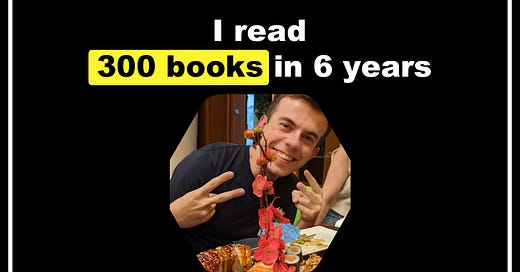😎 I read 300 books in 6 years. How to read faster (and learn more).
Avoid the brain crash and devour books with lightning speed! Learn strategies to boost your reading comprehension and retention. Even if you are a busy software engineer.
Don’t you wonder where is the “Reading II” subject?
We learn reading when we are 5 years old. It’s impossible we learn everything at that time and that’s it. Left to right, word by word, oh, and don’t underline with your finger!
The last book I read took me 25 calendar days. It was a small book, but I spent many days without picking it up. By the time I finished, I didn’t remember the beginning of the book.
Reading faster and finishing your books on time helps your understanding and retention. If you are reading a thick algorithms book, spend half an hour per page. But for the rest of the nonfiction books, most are longer than needed.
This means you can read them faster.
It doesn’t mean that you can read all books in under 1 hour. I get the skepticism to “speed reading”. That’s why I don’t use that word.
But I apply these techniques.
⭐ In this post, you’ll learn
The warmup of professional readers.
How to plan which books to read and your reading sessions like a pro.
Why do I carry a pen with my…
Keep reading with a 7-day free trial
Subscribe to Strategize Your Career to keep reading this post and get 7 days of free access to the full post archives.



